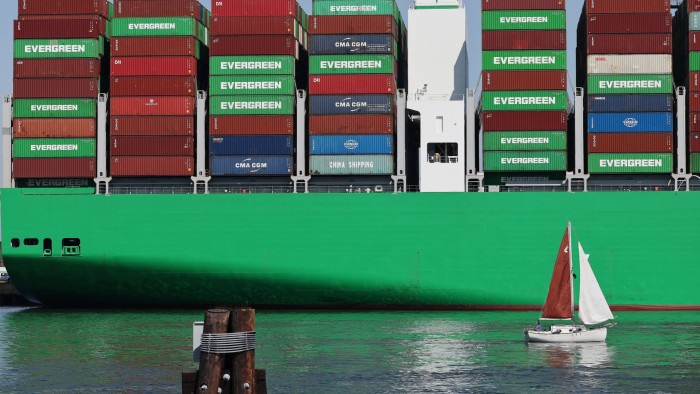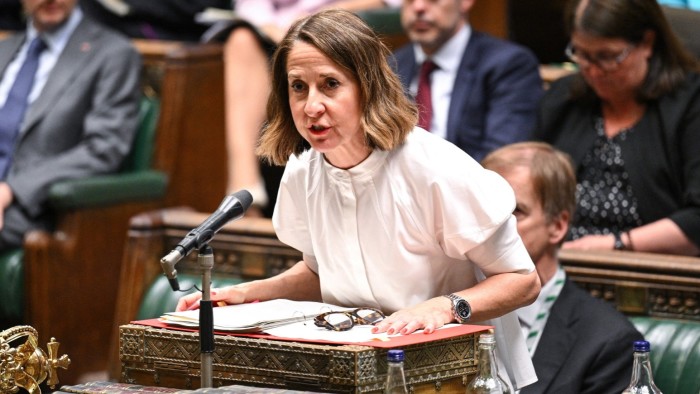Unlock the White House Watch newsletter for free
Your guide to what Trump’s second term means for Washington, business and the world
Donald Trump’s top trade officials are scaling back their ambitions for comprehensive reciprocal deals with foreign countries, seeking narrower agreements to avert the looming reimposition of US tariffs.
Four people familiar with the talks said US officials were seeking phased deals with the most engaged countries as they race to find agreements by July 9, when Trump has vowed to reimpose his harshest levies.
The narrower, piecemeal plan for new deals marks a retreat from the White House’s vow to strike 90 trade deals during the 90-day pause in the sweeping “reciprocal” tariffs the president announced on April 2.
But it also offers some countries a chance to strike modest agreements. The administration would seek “agreements in principle” on a small number of trade disputes ahead of the deadline, the people said.
Countries that agree these narrower deals would be spared the harsher reciprocal tariffs, but left with an existing 10 per cent levy while talks on thornier issues continue, the people said.
However, talks remain complex, and alongside its narrower approach to deals, the administration was also still considering imposing tariffs on critical sectors, people familiar with the matter said.
The twin track, involving the threat of new tariffs alongside openness to deals, underscores the difficulty facing negotiators with Trump, who has used trade as a cudgel to secure concessions from other countries.
Last week the president announced he would end trade talks with Canada, prompting Ottawa to immediately rescind a digital services tax that Washington objected to.
Trump triggered a global stock market rout in early April after imposing steep tariffs on the US’s largest trading partners, following weeks of a chaotic trade policy rollout marked by reversals and U-turns.
Although he has since walked back some of the most punitive levies, so far the US has only reached a trade pact with the UK and signed a tentative truce with China.
Foreign negotiators are now trying to understand what will come next.
The US commerce department had already launched national security probes — Section 232 investigations — into goods including copper, lumber, aerospace parts, pharmaceuticals, chips and critical minerals.
Several countries in serious trade talks with the US have sought relief from existing sectoral tariffs of 25 per cent on cars and their parts and 50 per cent on steel and aluminium.
The US’s trade deal with the UK provides a limited lower-tariff quota for British cars and pledges to negotiate other carve-outs for pharmaceuticals. The UK also won lower levies on steel and aerospace parts.
People familiar with the talks said the poor visibility of possible new sectoral tariffs the US might impose at a later date were hindering discussions.
On Monday, Treasury secretary Scott Bessent suggested the US was focused primarily on the reciprocal tariffs, and would leave sectoral levies until later.
“The Section 232s take longer to implement, so we’ll see what happens with those,” he said in an interview with Bloomberg TV.
It is also unclear how Trump will set any new tariff rates on countries that do not agree a new deal before the July 9 deadline.
On Monday, White House press secretary Karoline Leavitt said Trump was meeting with his trade team to set tariff rates for “many of these countries if they don’t come to the table in good faith”.
The president later suggested on his Truth Social account that Japan would be sent a new tariff rate, despite weeks of trade negotiations between them.
“To show people how spoiled Countries have become with respect to the United States of America, and I have great respect for Japan, they won’t take our RICE, and yet they have a massive rice shortage,” Trump wrote.
“In other words, we’ll just be sending them a letter, and we love having them as a Trading Partner for many years to come.”
Some people familiar with the talks said there was also uncertainty about whether Trump would stick to his schedule about ending his 90-day pause.
Bessent also told Bloomberg TV that any potential extensions to the July 9 deadline would be up to the president, but that he expected to see “a flurry” of deals ahead of the deadline.
But last week the Treasury secretary told Fox News that the US was negotiating with 18 trading partners and agreements could be done during the summer.
In May, two court rulings declared Trump’s use of emergency powers to impose reciprocal tariffs unlawful. The administration has appealed, but the rulings had also injected uncertainty into talks, people familiar with the negotiations said.
The White House declined to comment.






